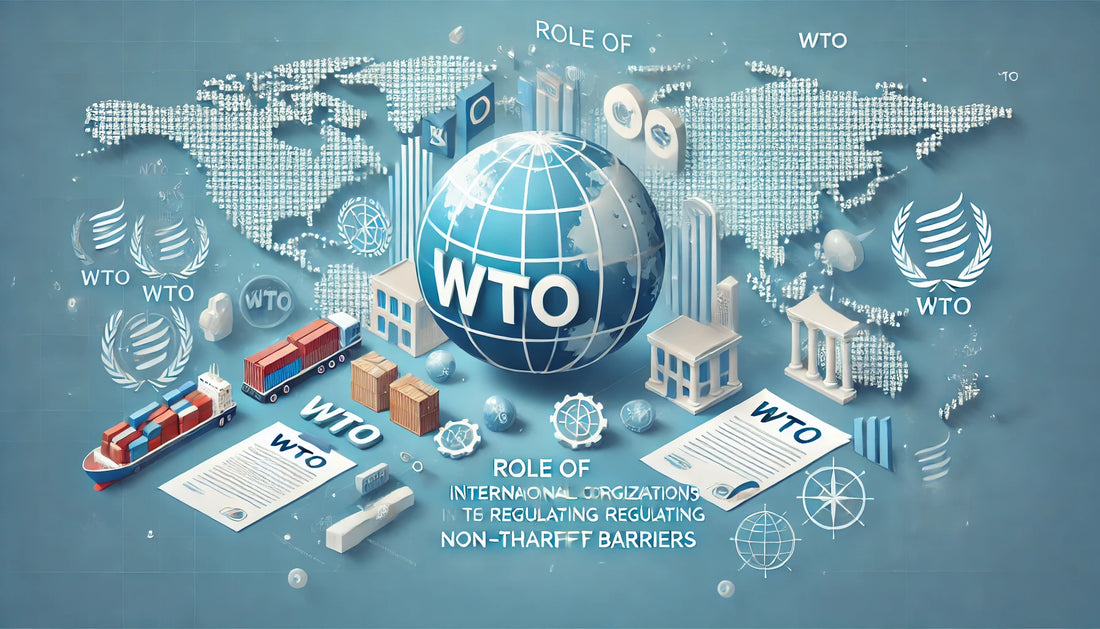The Role of International Organizations like the WTO in Regulating Non-Tariff Barriers
The globalization of markets and the liberalization of trade have significantly reduced tariff barriers over the past few decades. However, as tariffs have declined, non-tariff barriers (NTBs) have risen to prominence as alternative means for countries to protect domestic industries (Carbaugh, 2023). NTBs encompass a wide range of measures other than tariffs that can restrict international trade, such as import quotas, subsidies, import licensing, sanitary regulations, and technical standards. International organizations, particularly the World Trade Organization (WTO), play a crucial role in regulating these barriers to promote fair, transparent, and open trade among nations.
Establishing Multilateral Agreements
The WTO serves as the cornerstone of international trade regulation by establishing binding agreements that member countries must adhere to. Key among these are the Sanitary and Phytosanitary Measures (SPS) Agreement and the Agreement on Technical Barriers to Trade (TBT).
-
SPS Agreement: Established in 1995, the SPS Agreement sets basic rules for food safety and animal and plant health standards. It ensures that member countries' measures are scientifically justified, transparent, and non-discriminatory. Countries must base their SPS measures on scientific evidence and conduct risk assessments, thereby preventing the use of health and safety regulations as disguised protectionist tools (National Agricultural Law Center, 2021).
-
TBT Agreement: Also established in 1995, the TBT Agreement aims to ensure that technical regulations, standards, and conformity assessment procedures do not create unnecessary obstacles to trade. Members are encouraged to use international standards and must notify other countries of proposed technical regulations, allowing for consultation and feedback (National Agricultural Law Center, 2021).
Additionally, the General Agreement on Tariffs and Trade (GATT) Article XI generally prohibits the use of quantitative restrictions like absolute import quotas because they distort trade more severely than tariffs (Carbaugh, 2023). Exceptions are allowed under specific conditions, such as addressing balance-of-payments issues or protecting national security.
Promoting Transparency and Predictability
The WTO promotes transparency through notification and reporting requirements. Member countries must inform the WTO of any new or modified trade measures, including NTBs. This enhances transparency, allowing for monitoring and discussion among nations and helps prevent sudden and unexpected trade barriers (National Agricultural Law Center, 2021).
Regular trade policy reviews assess compliance with WTO agreements and provide a platform for dialogue on the use of NTBs. These reviews encourage members to adhere to agreed-upon rules and facilitate the identification and resolution of potential trade issues.
Dispute Settlement Mechanism
The WTO offers a formal process for resolving disputes related to NTBs. Member countries can challenge measures they believe violate WTO rules, and binding decisions ensure that countries comply with outcomes, promoting the fair application of trade measures (National Agricultural Law Center, 2021). For instance, Canada's canola exports to China faced NTBs when Chinese authorities withdrew import licenses in 2019. While this dispute extended beyond the WTO's mechanisms due to broader political issues, the WTO's dispute settlement system provides a structured process for addressing such trade barriers (Ufimtseva et al., 2023).
Facilitating Negotiations to Reduce NTBs
The WTO serves as a platform for multilateral trade negotiations aimed at reducing NTBs through the harmonization of standards and regulations. Successive rounds of negotiations have led to agreements that limit the use of NTBs and encourage the adoption of international standards. Ongoing discussions tackle new trade issues, such as digital trade regulations and environmental measures, which could become future NTBs if not properly regulated (National Agricultural Law Center, 2021).
Capacity Building and Technical Assistance
International organizations provide technical assistance to help developing countries understand and implement complex trade agreements related to NTBs. This enables all member countries to engage effectively in the global trading system. The WTO conducts training programs to help countries comply with SPS and TBT agreements and provides access to scientific research and data to support risk assessments required under the SPS Agreement (National Agricultural Law Center, 2021).
Impact on Trade and Welfare
Regulating NTBs has significant implications for global trade and welfare:
-
Enhanced Market Access: By preventing unjustified limitations on imports, regulation of NTBs improves access for exporters. For example, Canadian businesses exporting to Asia-Pacific countries benefit when NTBs are harmonized or reduced, as seen with efforts under the Comprehensive and Progressive Agreement for Trans-Pacific Partnership (CPTPP) (Ufimtseva et al., 2023).
-
Fair Competition: By curbing protectionist measures, international organizations promote a level playing field. Companies can compete based on quality and price rather than navigating complex and disparate regulations.
-
Reduction of Trade Costs: Harmonizing regulations lowers compliance costs for businesses, benefiting consumers through lower prices. According to the United Nations Economic and Social Commission for Asia and the Pacific (UNESCAP), NTBs increase trade costs by about 8.2% for technical measures and 7.1% for non-technical measures (Ufimtseva et al., 2023).
-
Economic Growth: Open and fair trade contributes to global economic development and prosperity. Reducing NTBs enhances supply chain reliability, an important aspect highlighted in Canada's Indo-Pacific Strategy (Ufimtseva et al., 2023).
Challenges in Regulating NTBs
Despite the efforts of international organizations, several challenges persist:
-
Balancing Trade and Legitimate Objectives: Countries may implement NTBs to protect health, safety, or the environment, which can conflict with trade liberalization goals. While the SPS and TBT agreements allow for necessary protections, distinguishing between legitimate and protectionist measures can be challenging (National Agricultural Law Center, 2021).
-
Complexity of NTBs: The technical nature of NTBs makes them difficult to monitor and address effectively. NTBs can range from import quotas and licensing requirements to complex certification procedures (Carbaugh, 2023).
-
Inequities Among Nations: Developing countries may struggle with compliance and enforcement due to limited resources. Implementing and benefiting from WTO agreements requires significant technical knowledge and infrastructure (National Agricultural Law Center, 2021).
-
Emerging Barriers: New forms of NTBs, such as digital trade restrictions and environmental regulations, require ongoing attention to prevent unnecessary trade obstacles. For example, Indonesia's proposed halal certification for food and beverage products poses new compliance challenges for exporters (Ufimtseva et al., 2023).
Case Studies: Canada-Asia Pacific Trade
The impact of NTBs and the role of international organizations are evident in Canada-Asia Pacific trade relations:
-
Canadian Canola Exports to China: The withdrawal of import licenses by China in 2019 acted as an NTB, significantly impacting Canadian farmers, who lost over C$2 billion due to lower prices and foregone sales (Ufimtseva et al., 2023).
-
Trade Agreements Addressing NTBs:
- CPTPP: Establishes clear definitions and enforceable rules for NTBs beyond WTO requirements, harmonizing measures, reducing compliance costs, and lowering the cost of goods.
- Canada-Korea Free Trade Agreement (CKFTA): Incorporates commitments to promote regulatory transparency and includes dispute resolution mechanisms, aiming to reduce NTBs while allowing necessary protections for health and safety (Ufimtseva et al., 2023).
Conclusion
International organizations like the WTO are essential in regulating non-tariff barriers to ensure they do not become unjustified obstacles to global trade. Through binding agreements, transparency measures, dispute resolution mechanisms, and capacity-building efforts, these organizations strive to promote fair, open, and predictable trading conditions. While challenges persist—particularly in balancing national interests with international obligations—the regulation of NTBs by international organizations is crucial for fostering global economic cooperation and development. As global trade continues to evolve, the role of organizations like the WTO in regulating non-tariff barriers remains vital in supporting a fair and prosperous international trading system.
References
Carbaugh, R. J. (2023). International Economics (18th ed.). Cengage.
National Agricultural Law Center. (2021). Basics of International Trade: Non-Tariff Barriers to Trade & the WTO. https://nationalaglawcenter.org/basics-of-international-trade-non-tariff-barriers-to-trade-the-wto/
Ufimtseva, A., Atkins, C., Rozario, P. S., & Gurney, R. (2023, October 4). Exploring Non-Tariff Barriers in Canada-Asia Pacific Trade. Asia Pacific Foundation of Canada. https://www.asiapacific.ca/publication/exploring-non-tariff-barriers-canada-asia-pacific-trade




